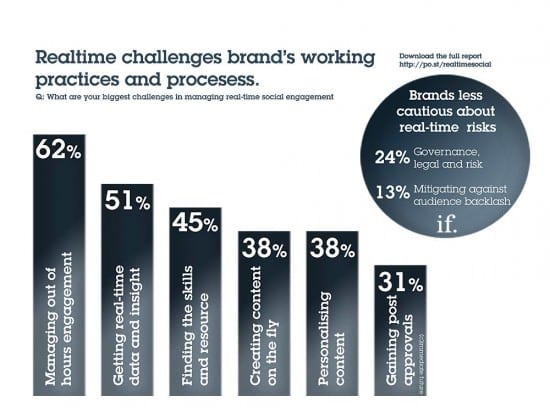Research showing how brands can struggle with the real-time challenge
In theory, real-time marketing seems straightforward. Follow the trends, be responsive to the interests of your audiences and build a live, relevant relationship with them. In practice, real-time marketing is not quite so easy though. Combining real-time online PR and social media marketing and integrating it with offline communications is time, resource and investment intensive.
In the latest benchmark report from immediate future, ‘In The Social Moment’, our research shows the practical hurdles of managing real-time marketing. It seems the struggle is more operational than about the risk to reputation...

It’s the everyday management, processes, technology and people, that is proving to be difficult. Most of the report’s survey respondents came from well-known, established brands. Brands with complex structures and traditional ways of working. The results reflect the immediate issues of managing real-time social engagement.
Business structures can limit real-time marketing
The biggest challenge for almost two thirds (62%) of brands is managing out of hour’s engagement. Social of course, goes beyond the 9-5 of business. Staff need flexible working and a level of trust that lets them work autonomously. Almost a third (31%) of brands also struggle with gaining post approvals. The traditional ways such as multiple approvals or several review meetings do not work for real-time. Instead those at the coal-face need to be trained and given the authority to keep on delivering content and engagement.
Which skills for managing real-time marketing are needed?
Which brings us on to another significant issue. Real-time social media marketing needs skilled resource to work in and out of hours. People with the experience, capability and expertise. Yet 45% of brands cannot find people with the right skills. People who can meet the need to create content on the fly. Hence 38% of brands find content production a challenge too.
Using the right tools for real-time marketing
62% of brands consider monitoring trends, headlines and conversations to be best practice. It is essential for responsive real-time engagement. But over half of brands (51%) tell us that getting real-time data and insight is a difficult challenge.
When you dig into the report though, it comes as no surprise that data analysis is difficult. Only 27% think it is best practice to use a monitoring tool. Those brands using tools are using a wide range, mostly free, and from different vendors. The data is not easily brought together and reporting is time-consuming.
Managing reputational risks of real-time marketing
With so much to contend with on the operational front, brands are less concerned about the risks of real-time. A quarter of brands are concerned about legal and governance issues. Only 13% of brands think the biggest challenge is in mitigating against audience backlash. Yet increasingly brands are in the limelight for getting the audience opinion wrong. Recent campaigns such as Coca-Cola at Sochi Olympics and Paddy Power’s ‘Oscar Campaign’ demonstrate the consequences of being on the receiving end of consumer vitriol.
Many of the answers to these challenges can be resolved with more resource, training and focus. Until brands can prove the value of real-time (or social for that matter) in hard numbers, it is difficult to justify the investment. Make measurement your priority if you want to avoid the struggle. Plan up front and pilot to prove the ROI. It will make real-time easier and results happen faster!







